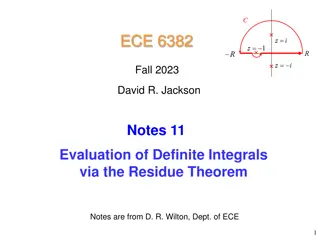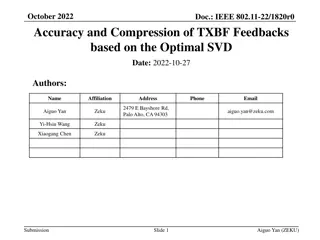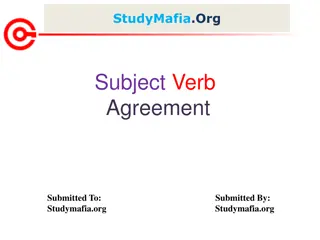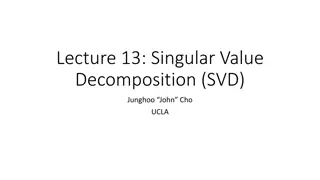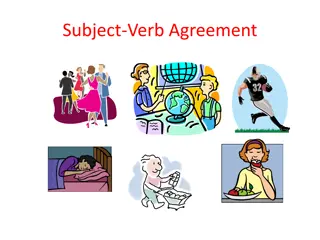High Potent Medicines Conference - EU Edition | Milan, Italy
Welcome to the MarketsandMarkets 9th High Potent Medicines Conference\u2013 the premier gathering for pioneers and experts in the realm of Highly Potent Active Pharmaceutical Ingredients (HPAPIs). This transformative event converges industry leaders and regulatory professionals on a singular platfor
0 views • 6 slides
Understanding Active and Passive Voice in English Grammar
Learn about active and passive voice in English grammar with clear explanations, examples, and rules. Discover how to transform sentences from active to passive voice while maintaining tense and meaning. Explore different tenses and their formations in both singular and plural contexts.
11 views • 14 slides
Join the Living Senior Family
Mmliving.org allows you to experience the elegance and charm of The Chandler Estate. With this premium brand, experience a singular fusion of comfort and elegance.\n\n\/\/mmliving.org\/san-antonio\/the-chandler-estate\/
2 views • 1 slides
Subject/Verb Agreement Practice Exercises
Practice identifying subjects and verbs, and correcting verb agreement errors in sentences. Examples include singular/plural subjects with corresponding verbs and compound subjects. Improve your understanding of subject-verb agreement through interactive exercises.
0 views • 5 slides
Understanding Subject-Verb Agreement in English Sentences
Learn about subject-verb agreement in English sentences with singular and plural nouns, first, second, and third person examples, uncountable nouns, and exceptions where plural nouns take singular verbs. Discover how to match the verb form to the subject noun in different scenarios to ensure grammat
2 views • 17 slides
Demonstrative Pronouns: This, These, That, Those - Examples and Exercises
Learn about demonstrative pronouns "this," "these," "that," and "those" with examples and exercises for both singular and plural nouns. Explore how to correctly use these pronouns in sentences and strengthen your understanding through interactive questions. Practice identifying and differentiating b
1 views • 17 slides
Analysis of Characterisation and Themes in Chapter Seven of "The Great Gatsby
In Chapter Seven of "The Great Gatsby," the characterisation of Gatsby, Daisy, Tom, and Nick deepens, revealing their complexities and motivations. Themes of the American upper class, the importance of time and the past, and the symbolism of weather come to the forefront. Gatsby's association with a
1 views • 63 slides
Understanding the Danger of a Single Story
Exploring the TED Talk "The Danger of a Single Story" by Chimamanda Adichie highlights how relying on a singular narrative can lead to stereotypes and misconceptions, hindering genuine connections and perpetuating power imbalances. Adichie's insights shed light on the importance of embracing diverse
0 views • 13 slides
Review of Definite Integrals using the Residue Theorem
Singular integrals involving logarithmic and non-integrable singularities are discussed, emphasizing integrability in the principal value sense. Cauchy Principal Value integrals and examples of their evaluations for singularities like 1/x are explored, highlighting the necessity of passing through t
0 views • 48 slides
Learn Plural and Singular Forms with Animals in English
This lesson focuses on differentiating between plural and singular forms using animals as examples. Students will learn to write sentences using "They're" for plural and "It's a" for singular, while looking at pictures of various animals. By the end of the lesson, students will be confident in using
1 views • 6 slides
Understanding Regions in Geography
Regions in geography are defined by common features such as climate, landscape, language, or religion. They serve as basic units of geography, with the Middle East being a notable example encompassing political, environmental, and religious characteristics. Regions can be classified based on physica
0 views • 10 slides
Innovations in Hasidic Yiddish Pronominal System
Explore the evolution of pronouns in the Hasidic Yiddish language system, showcasing simplifications and changes over time. The research delves into the linguistic characteristics of Hasidic Yiddish speakers in Stamford Hill, London, highlighting the influences of various Hasidic groups and geograph
1 views • 24 slides
Language Learning Activities for Verb Conjugation
Engage in interactive language learning activities to practice verb conjugation in the first, second, and third person singular forms. From grammar face-offs to filling in missing words, these exercises will enhance your proficiency in verb conjugation skills.
0 views • 7 slides
Essential Heroic Trait Comparison: Atticus vs. Another Hero
A comparative analysis through an argumentative synthesis essay between Atticus from TKAM and another hero, focusing on the most crucial trait all heroes should possess. The essay addresses opposing claims and highlights the importance of a singular heroic attribute.
0 views • 25 slides
Understanding Singular Value Decomposition (SVD)
Singular Value Decomposition (SVD) is a powerful method for solving systems of linear equations or matrices that are singular or close to singular. When LU-decomposition or Gaussian elimination fail, SVD provides a stable matrix decomposition helpful in various applications. It is particularly usefu
0 views • 17 slides
Guidelines for Forming Singular and Plural Nouns
This collection provides clear guidelines for forming singular and plural nouns, including adding "-s", "-y endings, and "-ies". It also covers exceptions, proper nouns, and tips on pluralizing certain words. Learn when to add "-es", double consonants, or when a false pronunciation might occur.
0 views • 21 slides
IEEE 802.11-22/1820r0: Accuracy and Compression of TXBF Feedbacks
This document discusses the accuracy and compression of Transmit Beamforming (TXBF) feedbacks based on Optimal Singular Value Decomposition (SVD). It covers the background, optimal SVD-based TXBF feedback (Decimation), simulation results, and proposals for overhead reduction schemes in the context o
4 views • 17 slides
Mastering Subject-Verb Agreement: Essential Grammar Rules for Class 10 English
Explore the fundamentals of subject-verb agreement in English grammar with Assistant Teacher Abul Kashem Miah. Learn the rules, examples, and practical applications for both singular and plural subjects. Enhance your understanding through comprehensive lessons and exercises. By the end of this class
1 views • 17 slides
Understanding the Singular Value Decomposition
The Singular Value Decomposition (SVD) is a powerful factorization method for matrices, extending the concept of eigenvectors and eigenvalues to non-symmetric matrices. This decomposition allows any matrix to be expressed as the product of three matrices: two orthogonal matrices and a diagonal matri
0 views • 35 slides
Understanding Subject-Verb Agreement in Grammar
Subjects and verbs must agree in number to ensure grammatical accuracy. Singular subjects require singular verbs, while plural subjects demand plural verbs. Various rules and examples illustrate how prepositional phrases, word order, and questions can impact subject-verb agreement.
0 views • 28 slides
Understanding Singular Value Decomposition and the Conjugate Gradient Method
Singular Value Decomposition (SVD) is a powerful method that decomposes a matrix into orthogonal matrices and diagonal matrices. It helps in understanding the range, rank, nullity, and goal of matrix transformations. The method involves decomposing a matrix into basis vectors that span its range, id
0 views • 21 slides
Understanding Singular Value Decomposition (SVD) in Linear Algebra
Singular Value Decomposition (SVD) is a powerful technique in linear algebra that breaks down any matrix into orthogonal stretching followed by rotation. It reveals insights into transformations, basis vectors, eigenvalues, and eigenvectors, aiding in understanding linear transformations in a geomet
3 views • 18 slides
Understanding Singular and Plural Nouns
Learn the rules of singular and plural nouns, including regular and irregular forms. Discover how to form plurals with examples like adding -s, -es, -ies, or -es to words ending in specific letters like -s, -x, -z, -ch, -sh. Enhance your grammar skills with this comprehensive guide.
0 views • 10 slides
All About Nouns: Types, Rules, and Examples
Explore the world of nouns - words that name people, places, things, or ideas. Learn about singular/plural, common/proper, concrete/abstract nouns, possessive/collective nouns, and rules for making singular nouns plural with helpful examples.
1 views • 22 slides
Understanding Subject-Verb Agreement in English Grammar
In this multimedia class session, Assistant Head-teacher Uttam Adhikary introduces the concept of subject-verb agreement, emphasizing the importance of matching singular subjects with singular verbs and plural subjects with plural verbs. Through engaging examples and presentations, students will lea
0 views • 41 slides
Understanding Singular and Plural Nouns
Singular and plural nouns can sometimes be confusing, but this guide clears up common misconceptions. Learn when to use plural nouns for singular items, how certain nouns can be singular or plural, and when to use singular or plural verbs with specific nouns like sports teams or companies. Recognize
0 views • 9 slides
A Guide to Subject-Verb Agreement Basics
Understand the essentials of subject-verb agreement in sentences. Learn how singular subjects match singular verbs and plural subjects pair with plural verbs. Discover key rules, including handling words between the subject and verb, dealing with prepositional phrases, and recognizing subject placem
0 views • 7 slides
Understanding Subject-Verb Agreement
Master the rules of subject-verb agreement for singular and plural subjects, irregular verbs like be, have, and do, and compound subjects. Learn how to match singular subjects with singular verbs and plural subjects with plural verbs, and understand verb forms for different scenarios. Explore exampl
0 views • 40 slides
Understanding Singular and Plural Indefinite Pronouns
Explore the difference between singular and plural indefinite pronouns with examples. Learn about singular indefinite pronouns like 'each' and 'nobody', plural ones such as 'several' and 'few', and those that can be both singular and plural like 'some' and 'all'.
0 views • 5 slides
Understanding Singular, Plural, and Possessive Nouns
Explore the basics of singular, plural, and possessive nouns with examples and guidelines on forming and using them correctly. Enhance your writing skills and grasp the concept of noun variations effortlessly.
0 views • 13 slides
Proper Use of Articles in English Grammar
Understand the correct use of definite (the) and indefinite (a/an) articles with countable and uncountable nouns, singular or plural nouns, adjectives, nationality words, and specific expressions. Learn when to use "the" with singular countable nouns and adjectives, and discover examples for clarity
0 views • 24 slides
Understanding Compound Subjects in Grammar
Compound subjects joined by "and" usually require plural verbs, while compound subjects joined by "or," "nor," "either or," or "neither nor" may be singular or plural depending on the subject closest to the verb. Recognizing when to use singular or plural verbs with compound subjects is essential fo
0 views • 5 slides
Evolution of Gender-Neutral Pronouns in English: Singular "They
The text discusses the evolution of using gender-neutral pronouns in English, particularly focusing on the acceptance and adoption of singular "they." It highlights the historical resistance, societal shifts, and linguistic authority approvals that have led to the emergence of "they" as a gender-neu
0 views • 11 slides
Understanding the Imperative Mood in Language
The imperative mood focuses on giving commands without reference to different time frames. It entails direct statements with the understood recipient mainly being 'you.' Commands in the singular, informal form involve dropping the 's' from the second person singular verb, both in affirmative and neg
0 views • 19 slides
Understanding Subject-Verb Agreement in Grammar
Explore the importance of subject-verb agreement in sentences, where a singular subject requires a singular verb and a plural subject needs a plural verb. Learn how to match subjects and verbs correctly to maintain agreement. Discover tips, examples, and resources to enhance your grammar skills effe
0 views • 73 slides
Understanding Subject-Verb Agreement in Grammar
Learn about subject-verb agreement with singular and plural nouns, including examples and explanations. Explore how collective nouns impact verb usage, whether they are treated as singular or plural. Practice exercises provided for better understanding.
0 views • 15 slides
Understanding Singular and Plural Numbers in English Grammar
Explore the concept of singular and plural numbers in English grammar. Learn about the rules for converting singular nouns to plural, including adding "-s" and "-es" as suffixes. Discover exceptions to the rules and when to use them. Enhance your knowledge of English grammar with practical examples
0 views • 27 slides
An Lp Theory for Outer Measures and Applications to Singular Integrals II
This content delves into the theory of outer measures, focusing on its application to singular integrals. It covers topics such as Carleson boxes, outer measures on the upper half-plane, sizes of functions on tents, outer essential supremum spaces, Lp spaces, embedding theorems, and weak L1-Sinfty e
0 views • 34 slides
Algebraic Homomorphisms and Singular Transformations in Mathematics
An exploration of Cayley's theorem analog for groups in algebra, showcasing the isomorphism of algebras with unit elements over fields to subalgebras of some vector space. Additionally, a discussion on characterizing singular transformations in finite-dimensional vector spaces over fields. The expla
0 views • 14 slides
PA Dutch 101 - Command Forms
PA Dutch 101 Video 37 covers Command Forms in Pennsylvania Dutch. There are three command forms: Singular, Plural, and Lets. The choice of form depends on the number of people being addressed. The Singular Form is used for one person, the Plural Form for multiple people, and the Lets Form when sugge
0 views • 8 slides








